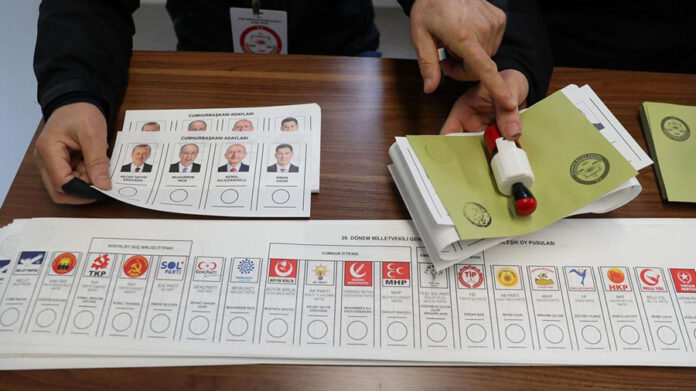On May 14, 2023, the people of Turkey went to the polls both for presidential and for parliamentary elections. Despite 21 years of economic crisis, oppression and conflicts in which the ruling regime dragged the country, Recep Tayyip Erdoğan and his party managed to get the highest number of votes.
Compared to the 2018 presidential election, Erdoğan’s vote was stagnant (about 26 million votes). Kılıçdaroğlu, supported by the opposition, fell behind Erdoğan in the first round, contrary to public opinion polls and expectations. This is despite the fact that he got about 24 million votes, almost 10m more than the Nation Alliance’s 2018 result.
According to the current results, which have not yet been finalized,
- 49.41 percent of the votes went to Recep Tayyip Erdoğan and
- 44.96 percent to Kemal Kılıçdaroğlu.
Since none of the candidates got 50 percent in the first round, a second round will be held on May 28 between the two main candidates.
The most important factor that contributed to the fact that there is a second round was the 5.2 percent of the votes received by the ultra-nationalist Sinan Oğan. This vote will play a key role in the second round. In addition, the actual turnout in the first hours of the elections was 87.21 percent, which is not a record high, as the authorities initially stated. This makes it crucial for the opposition to persuade voters who abstained to vote in the second round.
Parliamentary elections
In the parliamentary elections, the picture is as follows:
- The People’s Alliance (Erdoğan’s AKP + ultra nationalist MHP + others) elected 322 deputies with 49.36 percent, achieving a majority in the 600-seat parliament.
- On the opposition side, the Nation Alliance (6 party coalition led by Kılıçdaroğlu’s CHP) elected 213 deputies with 35.13%.
- The left coalition Labour and Freedom Alliance (the pro-Kurdish HDP, TIP and others) elected 66 deputies with 10.52%,
- Another leftist alliance, Union of Socialist Forces (SOL + TKP + others), got 0.29% of the votes.
Erdoğan’s AKP lost around 7 percent of its votes compared to the previous election. The ultra-nationalist MHP, which stood together with the AKP under the umbrella of the People’s Alliance, was one of the factors that influenced the result. MHP kept its number of votes, percentage and number of MPs stable, although it was expected that it would fall.
Although CHP and the Nation Alliance increased their vote share in many provinces, this was not reflected in the number of parliamentary seats. The complexity of the electoral system played a decisive role in this. Because, if a region does not receive enough votes to have a parliamentary seat, these votes are redistributed starting from the first ranked party. For this reason, although the People’s Alliance did not exceed 50 percent of the votes in total, the number of seats in the parliament was well above 50 percent.
The Labour and Freedom Alliance won 66 parliamentary seats. HDP/ YSP, the main component of the alliance, became the third largest force in the Parliament despite a 3 percent loss of votes compared to the previous election. TİP, which is a member of this alliance but stood in elections for the first time under its own banner, got 1.73 percent and elected 4 deputies. One of these MPs is Can Atalay, who is currently under arrest due to his participation in the social uprising in Gezi Park in 2013. Although TİP’s number of parliamentary seats did not increase, it’s results, considering it stood in elections for the first time under its own name and in only half of the electoral districts in Turkey, is successful.

What next?
Kılıçdaroğlu is running in the second round from a very disadvantageous, if not impossible, position. The earthquake, the economic crisis and the repressive regime that resulted from the total suppression of democratic rights and freedoms and the resulting social, political and economic collapse had created expectations and hopes in a big section of society that Kılıçdaroğlu would win. As a matter of fact, opinion polls showed that Kılıçdaroğlu would come first and Erdoğan would come second. However, the result was the opposite in this respect. This enabled Erdoğan to start the second round with a psychological advantage despite the fact that he failed to cross the 50 percent threshold in the first round. Also, the fact that the People’s Alliance has the parliamentary majority strengthens Erdoğan’s chances of being elected.
In the coming period, even if the regime wins, its job will not be easy. First of all, there is the economic wreckage worsened by the economic burden of the elections – let alone the world economic situation. On the other hand, although it will not be simple, there is already a good basis for the construction of a strong left opposition that will unite the movements inside and outside parliament. The struggle of the Labour and Freedom Alliance, made up of HDP/YSP, TİP and other parties and organizations, to evolve into such a force is a task that the Left has to work towards, with renewed conviction.



